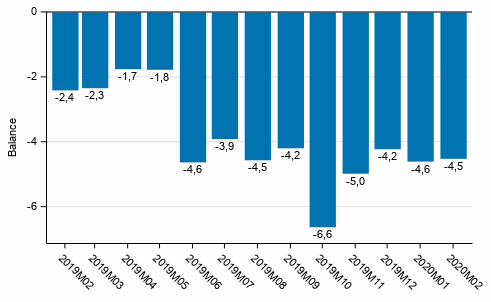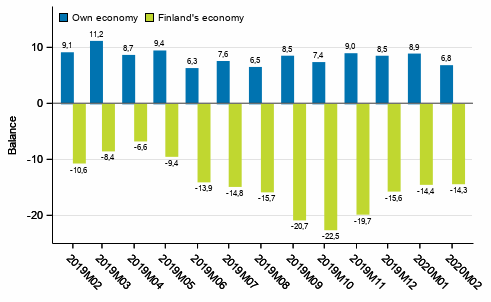Published: 27 February 2020
Consumer confidence in the economy unchanged in February
The consumer confidence indicator stood at -4.5 in February, having been -4.6 in January and -4.2 in December. In last year’s February, the consumer confidence indicator (CCI) received the value -2.4. The long-term average for the CCI is -1.7. The data are based on Statistics Finland’s Consumer Confidence Survey, to which 1,041 persons resident in Finland responded between 1 and 18 February. The long time series of the statistics were republished as level revised and reviewed in January. More information about the level revision can be found in the review of the January release .
Consumer confidence indicator (CCI)

Of the four components of the CCI consumers’ views of their own economy at present and in the near future weakened somewhat in February compared to January. Expectations concerning the near future of Finland's economy remained unchanged, but their views of spending money on durable goods improved somewhat. Compared with the corresponding period last year, the components of the consumer confidence indicator weakened apart from intentions to spend money, which remained more or less unchanged.
In February, consumers estimated that Finland’s economic development was weak. Views of their own economy were moderate.
Consumers' expectations concerning their own and Finland's economy in 12 months' time

Consumers’ views on the development of the unemployment situation in Finland improved to a good level. The personal threat of unemployment experienced by employed consumers remained on the long-term average level.
In February, consumers considered their own financial situation to be fairly good. The time was regarded favourable for saving and for raising a loan, but not particularly favourable for buying durable goods.
Consumer confidence by major region and population group
In February, consumer confidence in the economy was strongest in Greater Helsinki (CCI -3.3) and weakest in Eastern Finland (-7.5). Among population groups, upper-level salaried employees were most optimistic (1.1). Pensioners (-13.2) and unemployed persons (-12.4) had clearly the gloomiest expectations concerning economic development in February.
Consumer confidence usually decreases with the person’s age, and correspondingly the confidence typically increases as income grows. Men are likely to have better confidence in the economy than women. More detailed information is available in the Database tables .
EU results
The (seasonally adjusted) survey results concerning economic expectations for all EU countries are released monthly on the European Commission website: Press releases .
Concepts
The balance figures are obtained by deducting the weighted proportion of negative answers from that of positive answers. The consumer confidence indicator (CCI/A1) is the average of the balance figures for the CCI components. The components of the CCI are: consumer's own economy now (B1), consumer's own economy in 12 months (B2), Finland's economy in 12 months (B4) and consumer's spending money on major purchases in the next 12 months compared to the past 12 months (E1). The balance figures and the confidence indicator can range between -100 and +100 – the higher (positive) balance figure, the brighter the view on the economy.
Source: Consumer Confidence 2020, February. Statistics Finland
Inquiries: Tuomas Parikka 029 551 3276, Pertti Kangassalo 029 551 3598, consumer.confidence@stat.fi
Director in charge: Jari Tarkoma
Publication in pdf-format (421.2 kB)
- Reviews
-
- 1. Examination of answer distributions (27.2.2020)
- Tables
-
Tables in databases
Pick the data you need into tables, view the data as graphs, or download the data for your use.
Appendix tables
- Figures
-
- Appendix figure 1. Consumer confidence indicator (CCI) (27.2.2020)
- Appendix figure 2. Own economy (27.2.2020)
- Appendix figure 3. Finland's economy (27.2.2020)
- Appendix figure 4. Inflation (27.2.2020)
- Appendix figure 5. Unemployment (27.2.2020)
- Appendix figure 6. Favourability of time for (27.2.2020)
- Appendix figure 7. Own financial situation and saving possibilities (27.2.2020)
- Appendix figure 8. Intention to raise a loan, next 12 months (27.2.2020)
- Appendix figure 9. Spending on durables, next 12 months vs. last 12 months (27.2.2020)
- Appendix figure10. Intentions to buy, next 12 months (27.2.2020)
Updated 27.2.2020
Official Statistics of Finland (OSF):
Consumer Confidence [e-publication].
ISSN=2669-8889. February 2020. Helsinki: Statistics Finland [referred: 18.4.2025].
Access method: http://stat.fi/til/kbar/2020/02/kbar_2020_02_2020-02-27_tie_001_en.html

